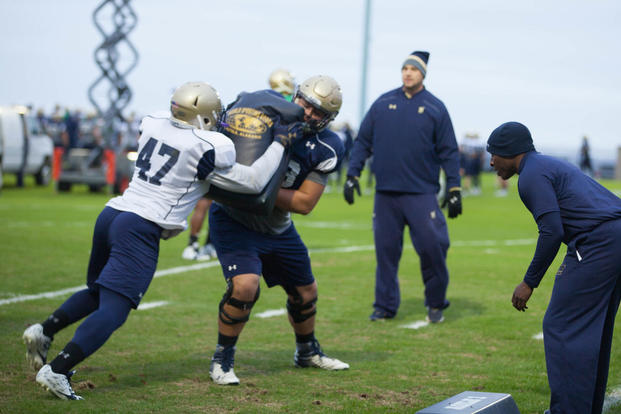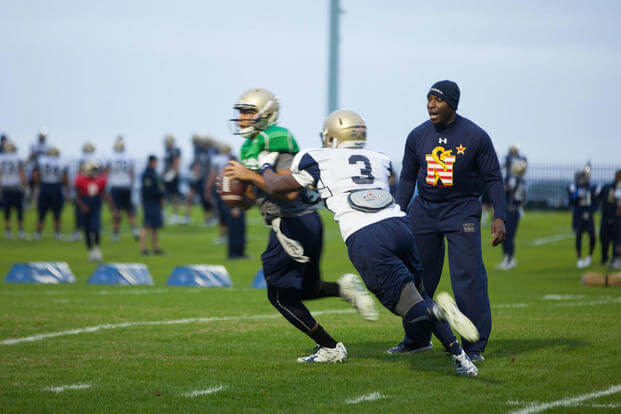ANNAPOLIS, Md. — "As a Navy football player here I took a lot of what I learned here into the Marine Corps,” said Lt. Col. Robert B. Green, the outside linebacker coach for the U.S. Naval Academy football team. “Being part of a team is being part of something that’s bigger than you.”
Throughout Green’s more than 18 years in the Marine Corps, he aspired to return to the Naval Academy and hoped to work with the Midshipmen on the football team. In 2013, Green got his chance when he was called back to the school to work in an administrative role with the Academy football team. In August, after having spent more than two years developing the student athletes off the field, he was given the opportunity to work with them on the field.
“It was a pretty easy decision to [select] Green from a standpoint of leadership, individual character and integrity,” said Ken Niumatalolo, the head coach of the team. “I knew what he stood for as a person. Even though he was lacking on the coaching side he knew how to lead men. He knew what the school stood for and what the Navy and Marine Corps stood for, and that far outweighed anything he might be lacking.”
Despite being a four-year letter winner and three-year starter on the football team as a defensive back from 1993-1996, and playing football throughout his Marine Corps career, Green knew that coaching at the U.S. Naval Academy would prove to be a difficult task.
“As a player, I thought I knew what it took to be a football coach, [but] I’ve learned more about football in the last two months here than I have in the 18 years of playing football,” said Green. “Coaches work extremely hard, from 12 to 16-hour days for some folks, just to get it right [and] try to put the pieces in place for the players to be successful on the field.
“As a coach, you want to be the best you can be, and Monday is the start of a new game week, so Sundays are spent on my laptop and looking over plays for my upcoming opponent.”
As a result from taking the position, Green has dedicated more of his time to developing the football players in their athletic roles. Gunnery Sgt. Timothy Owens, the senior enlisted advisor of the football team, assists Green in the administrative and leadership developing roles for the players.
“It was an eye opener for him [because] as a sports fan, we’ll sit down and watch football and talk about it and everyone thinks they know what they’re talking about, until you are sitting in the meetings with the coaches. It really shocked him how much work he has to put into it,” said Owens. “It was a no brainer when I told him, ‘Sir, I’ll let you know when I need you as far as leadership and development, but focus on the X’s and O’s,’ and when anything comes about I’ll come to him.”
According to Owens, the change in leadership roles has provided an opportunity for the Midshipmen to learn more about the complex nature of leadership, as they see the two working in tandem. Midshipmen begin to grasp how senior enlisted and officers work with each other to meet mission requirements.
“The main thing we focus on is the staff noncommissioned officer and officer relationship,” said Owens. “Anytime I come in contact with Midshipmen, we talk about that connection because we know in the Marine Corps that connection carries a lot of weight, especially when you have men and women under your charge.
“It’s like Lt. Col. Green and myself. The Midshipmen see the relationship and they recognize ‘Hey that’s how an officer and enlisted relationship is in the fleet, and I want to be a part of that.’ What the Midshipmen see is the finished product because he’s played here.”
Off the football field, Green reprises his role as a mentor and leader to the Midshipmen, ensuring their academic needs and requirements are met.
“I want to do my job first,” said Green. “I want to make sure these guys have the mentoring that they need and development is going the right way. I’m in uniform when I’m doing business outside this building. Inside the building and on the field I’m in coach’s attire. I’m running around, I’m a full time, whistle-blowing, play-yelling coach.”
Green strives to provide mentorship and care to the Midshipmen on more personal levels, according to Midshipmen Josiah Powell, an outside linebacker on the team.
“Sometimes our classes don’t give us a wide enough perspective of what it’s going to be like when we actually become commissioned,” said Powell. “A lot of times I go to the colonel if I need somebody’s opinion on that. We have books that we have to get signed. I went to him for the signature, talked to him about logistics and financial things, and [working] with enlisted personnel when we get commissioned.”
Green has developed alongside the team, learning in detail the plays the team would be required to remember for their upcoming games.
“When he first got here it was almost like there was another player in the back because we would be watching films and going over plays, and he was asking a lot of questions that you usually expect a player to ask,” said Powell. “Everyone was patient with him, and he was learning at a very fast rate. At the same time, he had stuff he could offer to us because he played defensive back when he was here.
“Around the University of Connecticut game he got to the point where he knew everything, and it’s now his job to make sure we know everything.”
Green’s career and knowledge have come full circle, as he uses his experiences in the Marine Corps to contribute to the football team’s success.
“The Marine Corps taught me leadership and to be a servant leader. The Marines are what’s most important, and I brought that back to football,” said Green. “I know that if I take care of my guys in the defensive room, and make sure they have all the things they need, then they’ll be great football players because they’ll [mature] faster than their counterparts.”



























